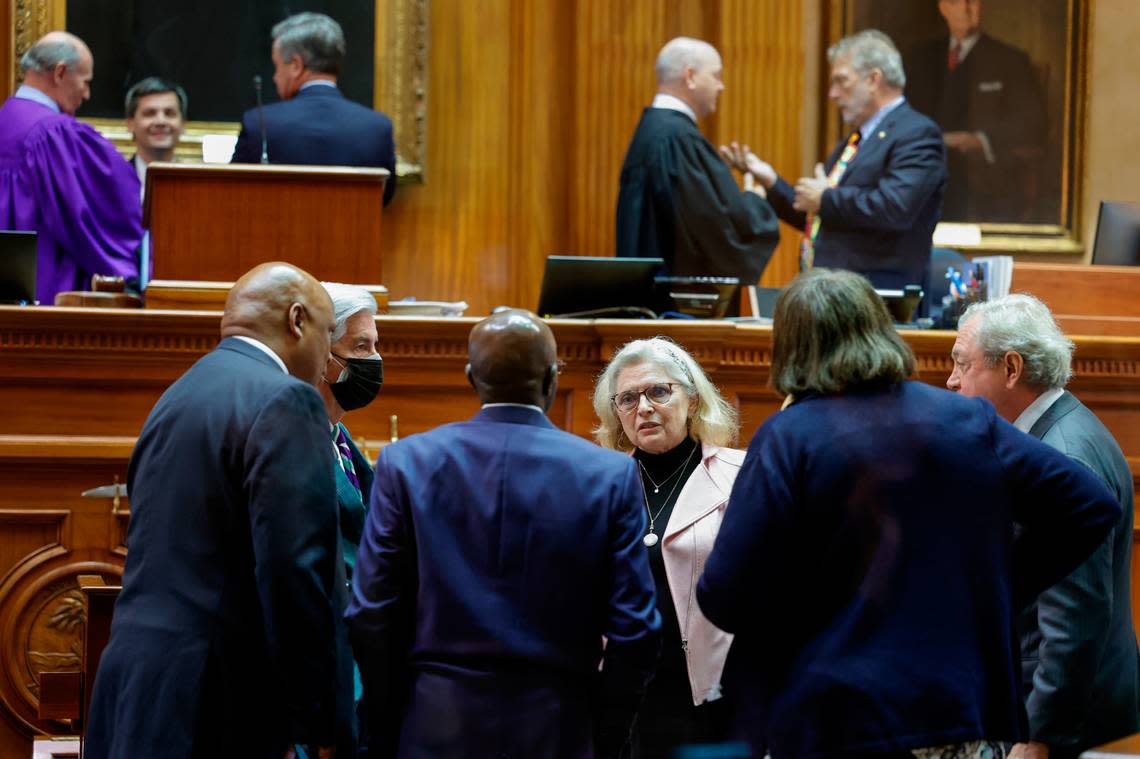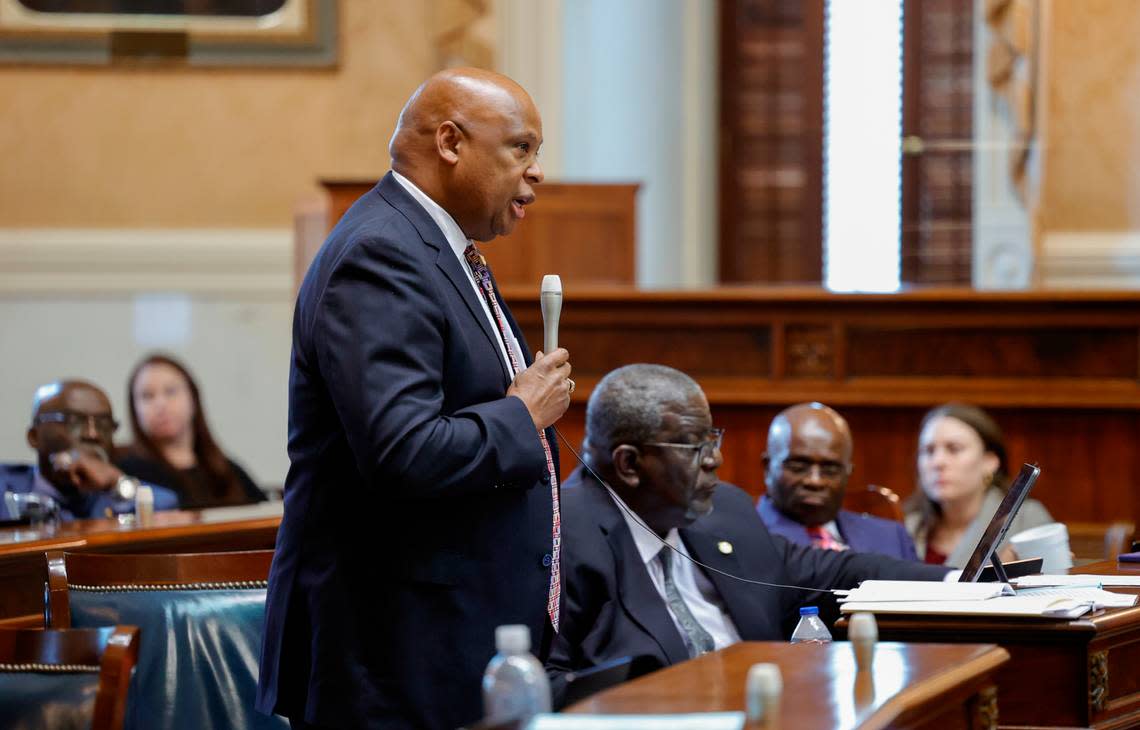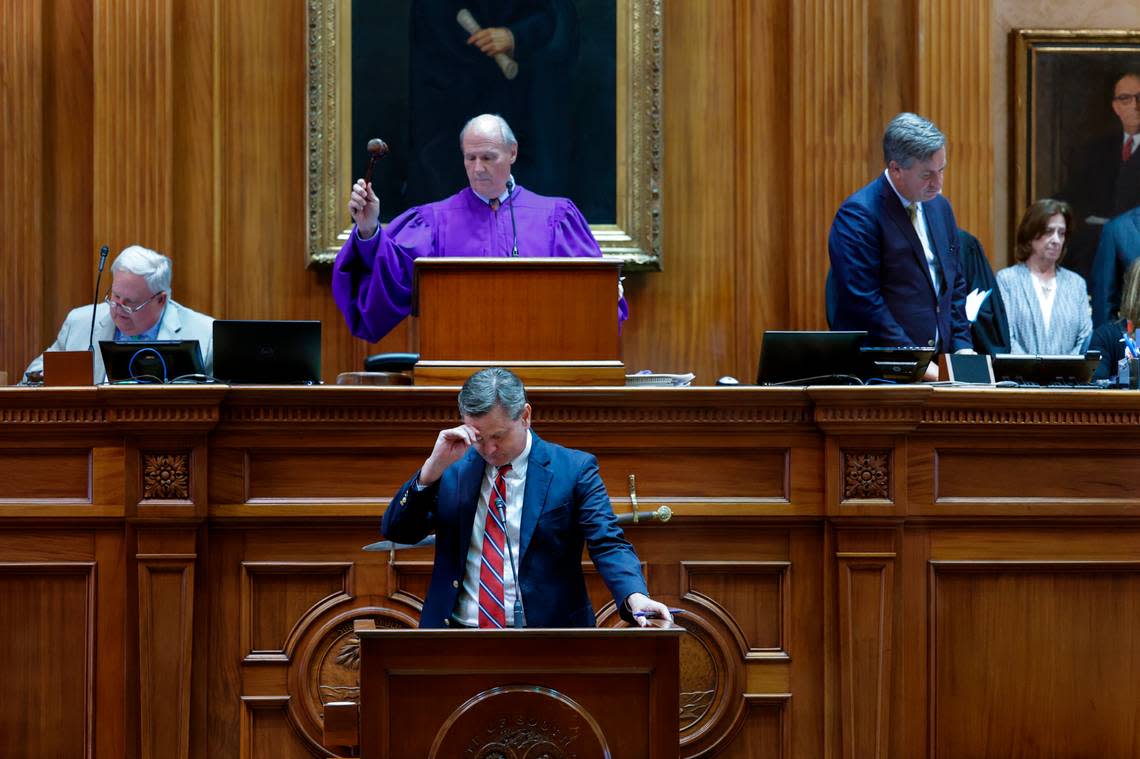Unable to pass stricter abortion law, SC Senate tweaks existing 6-week ban
Unable to find enough support to pass a near-total abortion ban, the South Carolina Senate on Thursday advanced legislation that would build on the state’s six-week law but limit the procedure for sexual assault victims up to 12 weeks.
“This is not where I wanted to be. I was hoping that we would do something pretty aggressive in response to Dobbs,” said Senate Majority Leader Shane Massey, R-Edgefield, citing the U.S. Supreme Court case that overturned the longstanding Roe v. Wade decision.
But, Massey added, there weren’t enough votes to ban abortions earlier than six weeks — an admission made after senators failed twice to stop a filibuster from Sen. Tom Davis, R-Beaufort.
“This is not everything that I wanted. But I do think that it is something the pro-life community ought to be proud of,” Massey told reporters after the vote. “We advanced the ball. We did save lives tonight, and I think that’s important. We were never going to pass a total abortion ban. Y’all knew that. We knew that.”
Massey said the amended House bill, H. 5399, would make the so-called “fetal heartbeat” law stronger. The law bans abortions once fetal cardiac activity is detected, or about six weeks, when critics argue that most women don’t know they’re pregnant.
Current law in South Carolina limits abortions up to 20 weeks of pregnancy after the state Supreme Court temporarily blocked the six-week ban passed in 2021. The case has yet to be resolved.
The bill makes an exception for the mother’s life and health in the event the pregnancy creates a “substantial impairment of a major bodily function, not including psychological or emotional conditions,” and it makes an exception for those who have become pregnant after being raped or from incest.
But it narrows the window for the procedure should the pregnancy be the result of rape or incest to first trimester, or 12 weeks, not 20 weeks as the six-week law allows. It would require that the doctor performing the abortion tell the pregnant woman that they will notify the county sheriff where the abortion was done no later than 24 hours after the procedure, with the woman’s name and contact information.
And it would require the doctor to preserve a DNA sample from the aborted fetus to give to the county sheriff, who must turn it into evidence within 90 days of being notified.
In addition, the bill also would make an exception for fatal fetal anomaly, or if the fetus is unable to survive outside the mother’s womb. But it would require that the anomaly be confirmed by two doctors who specialize in obstetrics or an area in which an anomaly is diagnosed.
The bill heads back to the House when the chamber will decide, possibly over the next two weeks, whether to accept the changes.
“The Senate’s bill — just like the House bill — strikes an appropriate balance,” said Gov. Henry McMaster’s spokesman Brian Symmes. “It is the governor’s hope that the House and Senate will soon come to an agreement and send a bill to his desk for signature.”
Though the legislation passed the Senate, 27-16, the two-day, hours-long debate highlighted the same problem that plagued House Republicans: Members of the political party that control the Legislature and the governor’s office are split on how restrictive an abortion ban should be.
“For me, in analyzing this issue, ... there ought to be deference given and greater weight given to the woman at the beginning of the pregnancy,” said Tom Davis, whose filibuster of the original near-total abortion ban and senators’ lack of votes to sit him down forced leadership — and some of the chamber’s most conservative members — to acknowledge the votes were never going to be there to completely ban the procedure.
The bill was then later amended to stay at six weeks, and Davis ultimately voted to pass it Thursday night.
Three of five women senators in the chamber voted against the bill: Republican Sens. Katrina Shealy of Lexington and Sandy Senn of Charleston and Democratic Sen. Margie Bright Matthews of Colleton.
State Sen. Mia McLeod, D-Richland, who has opposed restrictions to abortion access, had excused leave.
“I think we ladies have suffered a setback ... in the hands of a lot of white males in here,” Senn said before the vote. “But we’re going to live to fight another day. In reality, (the) white males feel like they’ve lost too, because what did they get?
“We’ve been here for two days and two nights, and we’re back basically to the same bill that was passed a year ago, and that the (state) Supreme Court has already taken off the table, at least temporarily. But because the Supreme Court has already indicated that they’re going to look at it, I do believe we’re going to live to fight another day.”
One female senator, Sen. Penry Gustafson, R-Kershaw, voted to pass the bill after the Senate agreed to add a fatal fetal anomaly exception, telling reporters after the final vote that she did it “for babies.”
“I did it to reduce abortions. I just don’t want to have as many abortions out there,” said Gustafson, adding she plans to help pass legislation to cover the expansion of contraceptive education and accessibility and enhance adoption law. “So I feel OK at the end of the day. I fought for what I thought should be in there. I fought for what my district wanted.”
And one Democrat, Sen. Kent Williams of Marion, voted to advance the bill.
SC Republicans reach compromise to pass bill
Similar to House Democrats, Senate Democrats put up an hours-long fight on the floor, theirs stretching two days.
With Republican female senators and Sen. Davis by their side, Democrats slammed Republicans for trying to ban all abortions that under its original form did not include any exceptions outside of the mother’s life and health.
And, in another case with Republicans, Democrats tried to put the issue on the ballot so voters could decide.
That effort failed.
Ultimately, like the House, Republicans after hours struck a compromise but only after failed attempts to cut off Davis’ filibuster. In the end, Republicans who opposed adding rape and incest exceptions and who opposed anything but a near-total ban agreed to Massey’s proposal to advance the bill.
“Did you know senator as much as I hate being put in this situation, I accept that as the fact of the matter and intend to vote for your amendment,” Sen. Richard Cash, R-Anderson, told Senate Majority Leader Massey.
In response, Senate Minority Leader Brad Hutto told reporters after the vote those Republicans “caved.”
“They pounded their chest, ‘We’ll always be there for you. We’ll vote for every single life.’ What did they do? They caved. They caved in the end,” the Orangeburg Democrat said. “It just shows you that they’re bunch a hypocrites in many regards. They made all these speeches up front. If they’d have stuck with what they said they were going to do, we wouldn’t have had a bill right now. But they caved.”
It was the Republican women of the Senate who stood up, Hutto said.
“It was the Republican men who let them down,” he added.
With the state Supreme Court having yet resolved the state’s six-week abortion ban case over whether the law violates the state’s constitutional right to privacy, Massey told reporters he’s confident the court “will get that right.”
Massey also acknowledged the differences on the abortion ban within his own party, but rejected any notion that women did not have a seat at the table in the debate over the bill.
“Women are not monolithic. You have very different opinions on things, just like men are not monolithic,” Massey said. “I mean, even if you’re a member of a political party, you don’t always think the same. I think that’s evident with what happened today.”
Moving forward, some senators on both sides of the aisle said they are committed to passing legislation that would, for example, expand access to contraceptives, bolster sex education in schools and require the state health plan cover prescribed contraceptives for dependents.
The latter, proposed by Davis, was added to the bill the day prior, but was removed under Massey’s change.
“I think we’ll fix that though (through separate legislation),” Massey said. “I don’t think there was opposition to the state health plan being extended to cover child dependents, so I think we’ll fix that. Hopefully we’ll do that early.”








